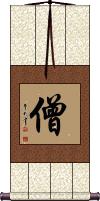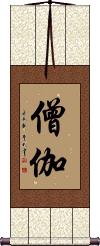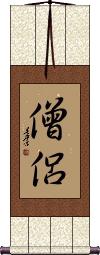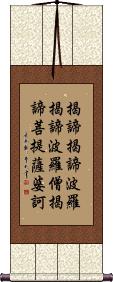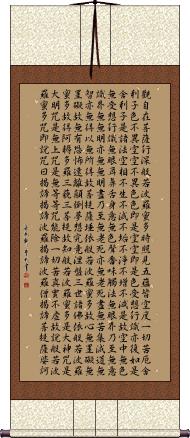Many custom options...
And formats...

僧 in Chinese / Japanese...
Buy an 僧 calligraphy wall scroll here!
Personalize your custom “僧” project by clicking the button next to your favorite “僧” title below...
2. Sangha
6. Heart Sutra
Sangha / Order of Monks
僧 is the single-character or short form of Sangha, the Buddhist idea of community or order (of monks, nuns, or followers of the Buddha).
Alone, this character can simply mean “monk” (Just means monk in Japanese).
![]()
![]() Note that when writing this as Kanji, Japanese will tend to write this in the form shown to the right. If you select our Japanese master calligrapher, please expect this special Kanji form.
Note that when writing this as Kanji, Japanese will tend to write this in the form shown to the right. If you select our Japanese master calligrapher, please expect this special Kanji form.
Sangha
In Buddhism, 僧伽 refers to a community of monks and/or nuns (one of the “Three Jewels”). In general terms, it can simply mean “all followers of the Buddha.”
Notes: Though there are not vast numbers of Chinese Hindus, in the Hindu faith, this term means “community together.”
The original Sanskrit word is also Romanized as samgha.
The first character means “monk.” The second character means Buddha or Shakyamuni.
僧伽 is a transliteration of the original Sanskrit, but it uses two very profound Chinese characters related to Buddhism.
Some may pronounce this as “seng qie” or “seng jia” in Mandarin (two possible pronunciations for the second character). Note that “qie” sounds like “chee-ah” using typical English pronunciation. Chinese Romanization is not actually designed to match English sounds.
![]()
![]() Note that when writing this as Kanji, Japanese will tend to write the first character in the form shown to the right. If you select our Japanese master calligrapher, please expect this special Kanji form. However, it should also be noted that this is not a common term in Japanese (except by certain sects of Buddhism or perhaps devout Buddhists in Japan).
Note that when writing this as Kanji, Japanese will tend to write the first character in the form shown to the right. If you select our Japanese master calligrapher, please expect this special Kanji form. However, it should also be noted that this is not a common term in Japanese (except by certain sects of Buddhism or perhaps devout Buddhists in Japan).
Buddha Dharma Sangha
Buddhist Monk
僧侶/僧侶 is a Japanese title for a Buddhist monk.
The first Kanji means Buddhist priest or monk by itself.
The second Kanji means follower or companion.
![]() Note, if you order this from the Japanese master calligrapher, the first character will look a bit more like the Kanji shown to the right than the Kanji shown above. Let us know if you have a preference, as both versions are technically-correct in both Chinese and Japanese.
Note, if you order this from the Japanese master calligrapher, the first character will look a bit more like the Kanji shown to the right than the Kanji shown above. Let us know if you have a preference, as both versions are technically-correct in both Chinese and Japanese.
Heart Sutra Mantra
Heart Sutra
This is the Heart Sutra in Chinese as translated by Xuanzang.
The Heart Sutra is often cited as the best-known and most popular of all Buddhist scriptures.
Notes: There are too many characters for this to be done by the economy calligrapher. You must choose a Master Calligrapher.
With this many characters, and the fact that one tiny mistake wipes out hours of work, keep in mind that writing the Heart Sutra is usually a full day of work for a calligrapher. This work and personal energy should be cherished and respected. In other words, the calligrapher is not charging enough money for the value that you are getting here.
Also, you will find that as my server processes 260 characters, the customization process is a bit slow for this title.
Not the results for 僧 that you were looking for?
Below are some entries from our dictionary that may match your 僧 search...
| Characters If shown, 2nd row is Simp. Chinese |
Pronunciation Romanization |
Simple Dictionary Definition |
僧 see styles |
sēng seng1 seng sou / so そう |
More info & calligraphy: Sangha / Order of Monks(1) monk; priest; (2) (abbreviation) (See 僧伽・そうぎゃ) sangha (the Buddhist community); (surname) Sou 僧伽 saṅgha, an assembly, collection, company, society. The corporate assembly of at least three (formerly four) monks under a chairman, empowered to hear confession, grant absolution, and ordain. The church or monastic order, the third member of the triratna. The term 僧 used alone has come to mean a monk, or monks in general. Also僧佉, 僧加, 僧企耶.; A fully ordained monk, i.e. a bhikṣu as contrasted with the śramaņa. |
僧伽 see styles |
sēng qié seng1 qie2 seng ch`ieh seng chieh sougya / sogya そうぎゃ |
More info & calligraphy: Sanghasangha (the Buddhist community) (san: samgha) (Skt. saṃgha) |
僧侶 僧侣 see styles |
sēng lǚ seng1 lu:3 seng lü souryo / soryo そうりょ |
More info & calligraphy: Buddhist Monk{Buddh} priest; monk; bonze Monastic companions, or company. |
佛法僧 see styles |
fó fǎ sēng fo2 fa3 seng1 fo fa seng buppō sō |
More info & calligraphy: Buddha Dharma Sangha |
七僧 see styles |
qī sēng qi1 seng1 ch`i seng chi seng shichisō |
A monastery is supposed to possess the following seven monks: 咒願師 invoker; 導師 leader; 唄師 intoner, or leader of the chanting; 散花師 flower-scatterer; 梵音師 master of sacred words, or Sanskrit; 錫杖師 shaker of the rings on the metal staff, or crozier; 堂達 distributor of missals, etc. Another division is 講師 expounder; 讀師 reader; 咒願師; 三禮師 director of the three ceremonies; 唄師; 散花師; and 堂達. |
下僧 see styles |
gesou / geso げそう |
low-rank priest |
丹僧 see styles |
tanzou / tanzo たんぞう |
(place-name) Tanzou |
久僧 see styles |
kyuusou / kyuso きゅうそう |
(place-name) Kyūsou |
亂僧 乱僧 see styles |
luàn sēng luan4 seng1 luan seng ransō |
A disorderly monk. |
五僧 see styles |
gosou / goso ごそう |
(place-name) Gosou |
亡僧 see styles |
wáng sēng wang2 seng1 wang seng mōsō |
dead monk |
京僧 see styles |
kiyousou / kiyoso きようそう |
(surname) Kiyousou |
仏僧 see styles |
bussou / busso ぶっそう |
Buddhist priest; (place-name) Bussou |
代僧 see styles |
daisou / daiso だいそう |
substitute priest |
伴僧 see styles |
bàn sēng ban4 seng1 pan seng bansou / banso ばんそう |
priests assisting at a Buddhist service half-monk |
住僧 see styles |
juusou / juso じゅうそう |
chief priest (of a Buddhist temple) |
侍僧 see styles |
jisou / jiso じそう |
acolyte |
供僧 see styles |
gusou / guso ぐそう |
(1) (abbreviation) (See 供奉僧・1) monk who attends to the principal image of a temple; (2) Buddhist monk serving at an attached Shinto shrine |
俗僧 see styles |
zokusou / zokuso ぞくそう |
worldly priest |
僧中 see styles |
sēng zhōng seng1 zhong1 seng chung sōchū |
within the saṃgha |
僧亮 see styles |
sēng liàng seng1 liang4 seng liang souryou / soryo そうりょう |
(personal name) Souryō Sengliang |
僧人 see styles |
sēng rén seng1 ren2 seng jen |
monk |
僧伍 see styles |
sēng wǔ seng1 wu3 seng wu sōgo |
The monastic ranks. |
僧休 see styles |
sēng xiū seng1 xiu1 seng hsiu Sōkyū |
Sengxiu |
僧佉 see styles |
sēng qiā seng1 qia1 seng ch`ia seng chia sōkya |
saṅkhyā, 僧企耶; intp. 數 number, reckon, calculate; Saṅkhyā, 'one of the great divisions of Hindu philosophy ascribed to the sage Kapila, and so called as 'reckoning up' or 'enumerating' twenty-five Tattvas or true principles, its object being to effect the final liberation of the twenty-fifth (Purusha, the Soul) from the fetters of the phenomenal creation by conveying the correct knowledge of the twenty-four other Tattvas, and rightly discriminating the soul from them.' M.W. Cf. 迦 and 數. |
僧位 see styles |
sēng wèi seng1 wei4 seng wei soui / soi そうい |
{Buddh} rank (of a monk) monk's rank |
僧体 see styles |
soutai / sotai そうたい |
(See 俗体・1) appearance of a Buddhist priest |
僧供 see styles |
sougu / sogu そうぐ |
(archaism) giving to a monk; offerings made to monks |
僧俗 see styles |
sēng sú seng1 su2 seng su souzoku / sozoku そうぞく |
Buddhist monks and secular people priests and laymen Monks and the laity. |
僧儀 僧仪 see styles |
sēng yí seng1 yi2 seng i sōgi |
The monastic custom, i.e. shaving head and beard, wearing the robe, etc. |
Click here for more 僧 results from our dictionary
The following table may be helpful for those studying Chinese or Japanese...
| Title | Characters | Romaji (Romanized Japanese) | Various forms of Romanized Chinese | |
| Sangha Order of Monks | 僧 | sou / so | sēng / seng1 / seng | |
| Sangha | 僧伽 | sougya / sogya | sēng qié / seng1 qie2 / seng qie / sengqie | seng ch`ieh / sengchieh / seng chieh |
| Buddha Dharma Sangha | 佛法僧 | buppō sō / buppōsō / bupō sō | fó fǎ sēng fo2 fa3 seng1 fo fa seng fofaseng | |
| Buddhist Monk | 僧侶 / 僧侶 僧侶 | sou ryo / souryo / so ryo | ||
| Heart Sutra Mantra | 揭諦揭諦波羅揭諦波羅僧揭諦菩提薩婆訶 揭谛揭谛波罗揭谛波罗僧揭谛菩提萨婆诃 | jiē dì jiē dì bō luō jiē dì bō luō sēng jiē dì pú tí sà pó hē jie1 di4 jie1 di4 bo1 luo1 jie1 di4 bo1 luo1 seng1 jie1 di4 pu2 ti2 sa4 po2 he1 jie di jie di bo luo jie di bo luo seng jie di pu ti sa po he | chieh ti chieh ti po lo chieh ti po lo seng chieh ti p`u t`i sa p`o ho chieh ti chieh ti po lo chieh ti po lo seng chieh ti pu ti sa po ho |
|
| Heart Sutra | 觀自在菩薩行深般若波羅蜜多時照見五蘊皆空度一切苦厄舍利子色不異空空不異色色即是空空即是色受想行識亦復如是舍利子是諸法空相不生不滅不垢不淨不增不減是故空中無色無受想行識無眼耳鼻舌身意無色聲香味觸法無眼界乃至無意識界無無明亦無無明盡乃至無老死亦無老死盡無苦集滅道無智亦無得以無所得故菩提薩埵依般若波羅蜜多故心無罣礙無罣礙故無有恐怖遠離顛倒夢想究竟涅盤三世諸佛依般若波羅蜜多故得阿耨多羅三藐三菩提故知般若波羅蜜多是大神咒是大明咒是無上咒是無等等咒能除一切苦真實不虛故說般若波羅蜜多咒即說咒曰揭諦揭諦波羅揭諦波羅僧揭諦菩提薩婆訶 观自在菩萨行深般若波罗蜜多时照见五蕴皆空度一切苦厄舍利子色不异空空不异色色即是空空即是色受想行识亦复如是舍利子是诸法空相不生不灭不垢不净不增不减是故空中无色无受想行识无眼耳鼻舌身意无色声香味触法无眼界乃至无意识界无无明亦无无明尽乃至无老死亦无老死尽无苦集滅道无智亦无得以无所得故菩提萨埵依般若波罗蜜多故心无罣碍无罣碍故无有恐怖远离颠倒梦想究竟涅盘三世诸佛依般若波罗蜜多故得阿耨多罗三藐三菩提故知般若波罗蜜多是大神咒是大明咒是无上咒是无等等咒能除一切苦真实不虚故说般若波罗蜜多咒即说咒曰揭谛揭谛波罗揭谛波罗僧揭谛菩提萨婆诃 | |||
| In some entries above you will see that characters have different versions above and below a line. In these cases, the characters above the line are Traditional Chinese, while the ones below are Simplified Chinese. | ||||
Successful Chinese Character and Japanese Kanji calligraphy searches within the last few hours...
